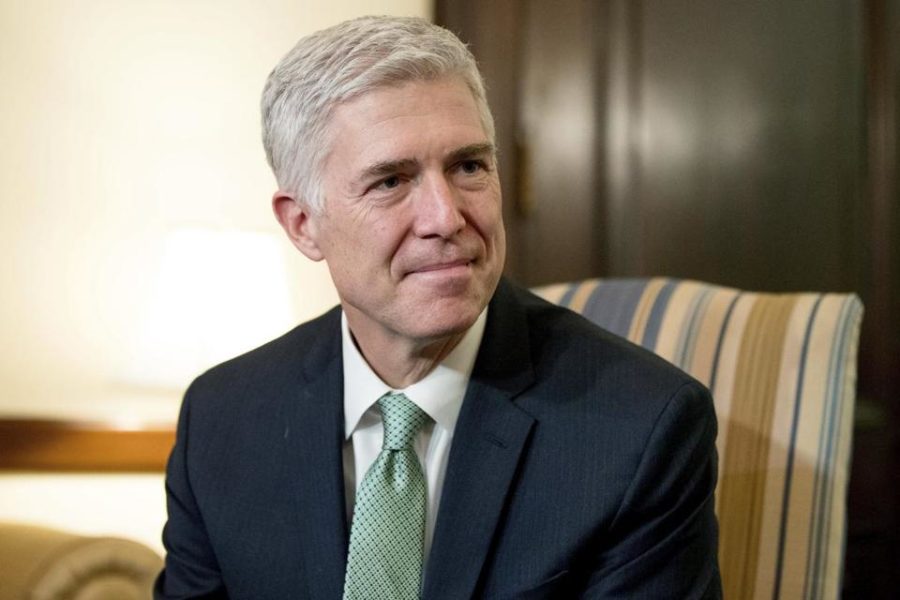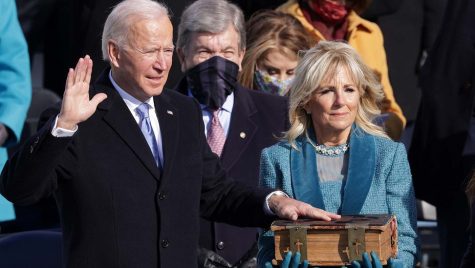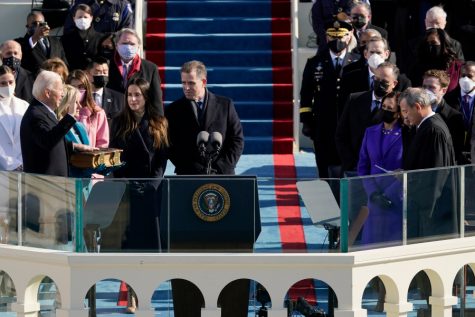The Supreme Court nomination process intensifies
In January of 2017, President Donald Trump announced his Supreme Court nominee, Judge Neil Gorsuch of the Tenth Circuit Appeals Court in Denver, Colorado to claim the vacant position left on the Court by the death of former Judge Antonin Scalia.
Gorsuch was born into a political family from Denver Colorado, as his mother was a Colorado state house representative and the first female Administrator of the Environmental Protection Agency.
Gorsuch is well-educated as he attended a private secondary school, Georgetown Preparatory School, in Maryland and would earn a Bachelor of Arts from Columbia University, a Juris Doctor from Harvard Law School, and a doctorate in legal philosophy from Oxford University.
In addition to working as a clerk for several different judges and justices, U.S Supreme Court Justices Byron White and Anthony Kennedy from 1993-94, Gorsuch was employed by the Bush Administration’s Justice Department as Principal Deputy to the Associate Attorney General from 2005 until his appointment to the Tenth Circuit in 2006.
Gorsuch subscribes to the judicial theory of textualism and constitutional originalism, which are beliefs in adherence to a literal and strict interpretation of the United States law and the Constitution that does not change due to external sociological factors and does not incorporate the history which surround laws.
Gorsuch has advocated for judicial restraint, which is a belief that justices should not rule according to their own personal values or beliefs, but according to what literal interpretation is found within the Constitution and other laws. However, Gorsuch is widely known as legal conservative in belief due to his consistent rulings on cases that concern religious liberty. Most notably, the opinion of Gorsuch which agreed with ruling on the landmark Supreme Court decision of Burwell v. Hobby, which allowed business owners to restrict or deny, at their own discretion, services or accommodations for employees that may be viewed as religiously objectionable.
Despite his qualifications, Gorsuch should not be confirmed as United States Supreme Court Justice. Gorsuch was among a selection of many different judges for that same position, chosen by the establishment of the Republican party.
None of them should be confirmed as well.
As aforementioned, former Supreme Court Justice Antonin Scalia passed in February of 2016. While it was the last year of his eight year term, it was well within the duty and responsibility of former U.S. President Barack Obama to nominate a replacement for the office held by Justice Scalia.
President Obama did.
On March 16, 2016, President Obama nominated Judge Merrick Garland of the United States Court of Appeals for the District of Columbia to the available seat on the U.S. Supreme Court.
As stated in Articles I and II of the United States Constitution, the President has the authority to nominate federal judges to for offices, however; the Senate has the power to confirm or deny the appointment of federal judges that were nominated by the President.
During the later half of the second term of the Obama Administration, the Democratic party had lost a majority of congressional seats in both the Senate and the House. The Democratic party had lost nine seats to have a total of 44 Democratic representatives within the Senate, while their Republican counterparts gained nine seats to have a total of 54 Republican representatives within the Senate. The agenda and interests of the Obama Administration and Congressional Republicans conflicted often. Primarily on typical partisan issues, like tax reform, gun rights, and social questions of race and gender equity.
Simply speaking, as it was outlined in the U.S. Constitution and basic norms, it President Obama’s seat to fill.
The appointment of federal judges to U.S. Supreme Court by the Senate requires 60 votes, which typical requires votes from members of both the Democratic and Republican parties.
Congressional Democrats, most notably Democratic Senate Minority Leader Chuck Schumer of New York, had stated that fellow members of their party intend to filibuster to nomination vote of Gorsuch in protest to the treatment of Judge Garland.
Judge Garland’s nomination pended before the Senate for approximately 293 days (about ten months) without officially moving beyond the introductory phase.
In reciprocation for the denial of a standard procedural preliminary confirmation hearing for Judge Garland and the delaying of consideration until the expiration of Garland’s nomination on the last day of the 114th Congress by Republican majority leaders, Congressional Democrats intend to block the nomination of Gorsuch on both ethical and ideological lines.
The Democratic filibuster of Judge Gorsuch has been one of the few moments in American political history in which a Supreme Court nominee was actively filibustered.
As precedent, retired former Democratic Senate Majority Leader, Harry Reid (D-NV) lowered the amount of votes needed to pass a cloture to a simple majority when appointing judges to lower courts.
While it may seem childish in nature, an attitude of vengeance for some past act, the treatment of Judge Garland was unjust. It is merely dismissed as a part of “partisan politics”, however, it seems unprofessional and to deny an appointment of a federal judge due to political reasons and not credentials or qualifications.
It seems so contrary to what is respectable to the functioning of government: it is not a law that is being protested, but an intragovernmental conflict among members of the legislative and executive branches to determine the ideological balance of an institution that partly serves a basis of American democracy.
There was enough time to properly interview and vote on Judge Garland.
This situation, in which Senators find themselves, seems to have been avoidable.
Ethically, Gorsuch should not be confirmed.
Liberal organizations, groups, and media have referred to the vacant seat on the Court as wrongfully “stolen” from President Obama. That phraseology, of a some thing, more specifically, a democratic institution, rightfully belonging to a single person or group, seems unethical, but semantically, that sentiment, of acting childishly and stealing, remains true.
Common thinking on this topic is that if federal judge is not able to receive a majority of 60 votes in favor of their appointment, then the nomination should change, not the rules by which a federal judge is appointed.
Although widely regarded as the most liberal-minded Justice in legal thought, Justice Ruth Bader Ginsburg received 97 votes in favour of her appointment to the Supreme Court.
The most conservative-minded Justices in recent memory, Sandra Day O’Connor and Antonin Scalia had received 99 and 98 votes respectively for their confirmation hearings.
While Justices have not always been confirmed in such an almost unanimous fashion, for example, conservative Justice Clarence Thomas’s confirmation passed by a narrow margin of four votes on that were along heavily partisan lines over sexual harassment charges brought against him when the confirmation process required a simple majority vote, however, it seems counterintuitive to establish rules, like setting a threshold of 60 votes to confirm Supreme Court nominees, only to dismantle them at convenience and leisure.
The nomination of Judge Gorsuch has been accepted by the Senate Committee on the Judiciary by an 11 – 9 vote. It will then be sent to the floor for debate, discussion, and voting.
Udate:
Senate Majority Leader, Mitch McConnell (R-KY) has successfully changed the rules of the Senate by a simple majority vote to end any possibility of a Democratic filibustering of Supreme Court nominee, Judge Neil Gorsuch by lowering the threshold by which a cloture can be passed.
The process to which Sen. McConnell appealed to permanently change the Senate rules is referred to by media figures as the “nuclear option” in which the number of votes needed to pass a cloture was formally challenged by Sen. McConnell and then put forward by the Senate for a simply majority vote where McConnell’s appeal was accepted.
Judge Neil Gorsuch is expected to pass by a simple majority during his confirmation vote that has been scheduled for Friday, April 7th, 2017.

I am in 12th grade. I would like to study political science at the post-secondary level. I chose to study journalism because the critical thinking and...








